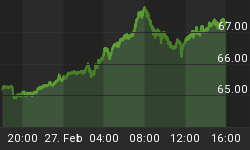The Dow Jones Industrial Average (DJIA) rose 150 points on Wednesday on hopes of a second Chinese stimulus package. This rally shows the dependence the world has on the resurgence of China and begs the question: Does China needs the US or do we need China? As discussed below, it should be clear that the US needs China.
The chart below shows an estimated composition of Wednesday's moves.

Caterpillar, Chevron and Exxon - the commodity-related companies that benefit from a growing Chinese economy - added 47 points or 31% of the index's gains. Without China and global growth, the outlook for these American companies, like all domestic American companies, is bleak to non-existent.
The bottom five financial companies (quasi-financial in GE's case) subtracted 18 points from the index's advance. Even more interesting, without China buying our government debt and keeping US interest rates absurdly low, all five companies already would have been forced to file bankruptcy which, in the short-term, would create even bigger problems for the US economy.
It is also worth mentioning Walmart in any discussion regarding our dependence on China. If not for China, Walmart's profits would be lower because its costs would be higher. Furthermore, lower prices at Walmart increase Americans' purchasing power and in turn raise our standard of living. The Chinese, on the other hand, barely benefit by receiving more Dollars each day in exchange for their hard work for wages that are below what Americans would be paid in the US. Thanks to China, our standard of living is much higher than it would be otherwise.
Looking ahead, as US interest rates remain low, foreign governments stimulate growth, and the dollar begins to fall, the large weighting of commodity/international companies in the DJIA will help the index rise (see second column in table above). But this by no means will signal that the US economy is improving. In fact, the rise of CAT, CVX and XOM on Wednesday actually signified a decline in the relative standard of living of US citizens. China will be consuming commodities, which will push up prices and inflation in the United States while not providing similar job growth in this country. Ultimately, this will force interest rates higher in the United States, which will pressure domestic spending and domestic asset prices (this is even before taking into account the funding needs of the Obama budget deficit).
Wednesday was a preview of what lies ahead for the United States and global financial markets. Recently, fixed income investors have been buying assets that the United States Government/Central Bank has been buying/guaranteeing. This strategy is partially right. Investors should be buying the assets that will benefit from the Chinese Government's stimulus rather than those artificially supported by the US Government. Certain US stocks will benefit from China's growth such as the ones that rose Wednesday. However, should this occur, the standard of living in the US will be sacrificed and it will be clear that US investors actually need China much more than China needs the US. The best way to capitalize on this situation is through commodities and domestic Asian companies.















